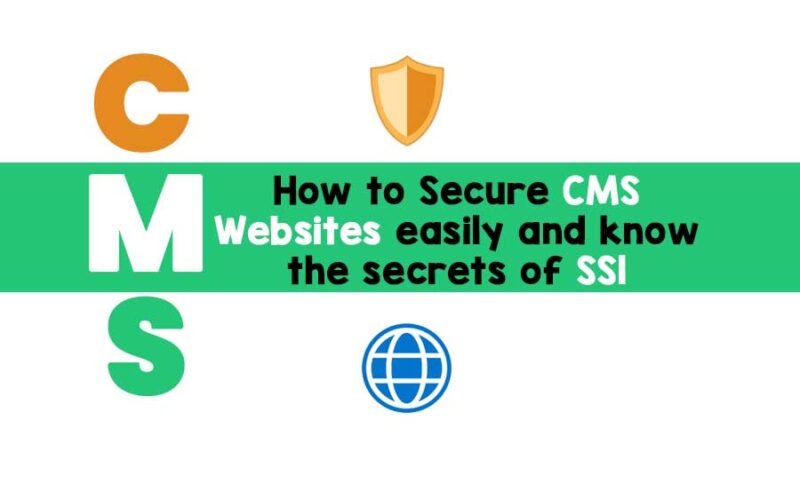How to Secure CMS Websites easily and why SSL is important?: A content management system, or CMS, is a software tool that allows users to create and manage websites without having to construct them from the ground up or even knowing how to program.
A content management system (CMS) allows you to generate, manage, revise, and publish information using a user-friendly interface. Rather than coding, you may alter the appearance and style of your site by downloading or purchasing themes and plugins. You can have numerous users operating in the same application’s backend, among other things.
You might be perplexed as to how a single piece of software can accomplish so much. Let’s take a closer look at how a CMS functions to address that issue.
Table of Contents
How to Secure CMS Websites easily and why SSL is important?
A content management system (CMS) is made up of two main components: a content management application (CMA) and a content distribution application (CDA). These programs, when used together, effectively perform all of the coding, database queries, and architecture on the back end, allowing you to concentrate on the front end of your website.
Rather than starting with an empty HTML page, you may use the material editor to bold text, add links and CTAs, and include photos and tables by drag – and – drop components or hitting a few button.

According to statistics, the most extensively used Content Management Systems are WordPress, Joomla, and Drupal. WordPress is the most popular CMS platform for hackers, followed by Joomla, Drupal, and various other CMS systems.
Before we go into how to secure CMS, let’s have a look at how hackers can seize power of a website.
Outdated websites
Using an out-of-date CMS version also means that the system’s security has not been upgraded. New security patches and upgrading are published with each new version of the software update.
Easily accessible through the login screen
Although the frontend login may be simple for consumers, it is a popular approach for attackers and bots to obtain access. The strength of the password is also important; if the password strength is weak, it can be readily broken. Because the admin panel has accessibility to the same website, a hacker might enter a series of passwords several times to get access to a particular admin panel.
Additional Add-ons
One of the grounds for hacking is the use of unauthorized plugins, modules, themes, and other injectors. If their weaknesses are not repaired, hackers will have a high chance of gaining entry through these unregulated plugins.

These are the flaws that allow a website to be readily hacked; however, if we create the website using solid security principles, it will be more trustworthy and less vulnerable to hacking. The following are some methods and solutions for securing CMS websites:
Also Know About
Restrict the number of login attempts
Limiting the amount of login attempts would prevent malicious attacks and make it more difficult for hackers or bots to get access to the database.
Two Factor Authentications (2FA)
In order to strengthen the website’s security, two layers of security upon login would be required. Authenticator plugins can be used to deliver an OTP to the user’s registered cellphone or email address, which must be verified before the user can log in.
Verified plugins
As we previously highlighted the risks of installing unauthorized plugins, it is suggested that you use authorized plugins to keep your system safe.
Implement a firewall
A firewall adds an extra layer of security to the network by blocking undesirable IP addresses. Having a firewall in place for all CMS websites adds another layer of security and allows you to track questionable activity.
Keep the website updated
When an update is available, the CMS site and its plugins must be updated on a regular basis. Developers would frequently offer updates and patches that included new security improvements, guaranteeing that the website was safe from attackers.
Also Know About
SSL Certificate
An SSL certificate is a chunk of code on the server that provides security between internet interactions. It is introduced to increase the security layers of the website. The SSL certificate provides an encrypted connection when a web browser visits a secured website.
Access permissions to users
Limiting access to specific modules of the programme improves security significantly.
Change passwords on regular basis
Passwords should be changed frequently, and password complexity should be increased by using special characters and other unique combinations.
Why to Install an SSL Certificate on Your Website
In this post, we’ll discuss the significance of an SSL certificate for a website. If you believe this feature is a premium, you are mistaken. From a security standpoint, this is now a requirement for any website, personal or commercial. Without further ado, here are five reasons why you should pursue the credential.

Data protection
Essentially, the purpose of this certificate is to secure server-client interaction. It aids in the encryption of all data. In other words, all sorts of data are encrypted and can only be retrieved by the intended recipient’s server or browser. SSL plays a crucial role in the management of sensitive data such as credit card information, passwords, and IDs.
Identity confirmation
Another important function of an SSL certificate is to verify a website. Identity verification is crucial when it comes to internet security. Many amateurs lose thousands of dollars each year as a result of fraudulent websites.
The skimmers and hackers will face several hard effort to break such walls.
Also Know about
Your business fails because you underestimate the power of Graphics arts unknowingly
The installation of an SSL certificate necessitates a thorough validation procedure. A reputable authority called a Certificate Authority establishes this process. The authority verifies the individual’s or organization’s identity based on the accreditation type. Your website or blog will receive trust indications as a result of this approach.
Search Engine Ranking
Google’s algorithm was updated in 2014 to provide websites with the HTTPS tag an advantage. According to numerous studies conducted by various SEO professionals, there is a substantial correlation between greater search engine results and HTTPS.
Requirements of the PCI/DSS
If your company sells items and services via the internet, you may have an online payment system in place. Your business website must be PCI compliant if you wish to accept payments online. You must meet 12 conditions in order to comply with this regulation. An SSL certificate is one of these criteria. As a result, you must have this qualification.
Customer Trust
When it comes to consumer trust, the SSL certificate is vital in addition to account security and cryptography. This certificate indicates that the website is reliable. Your buyers will be able to see some crucial facts about your company if you activate this certificate. This information assists people to recognize you as a legitimate business.
Google made having an SSL certificate a requirement for websites in 2018. The search engine giant flags websites that do not have this certificate.
Wrapping Up To summarise, if you want to earn your clients’ confidence and rank well on major search engines, we recommend getting an SSL certificate for your website.
